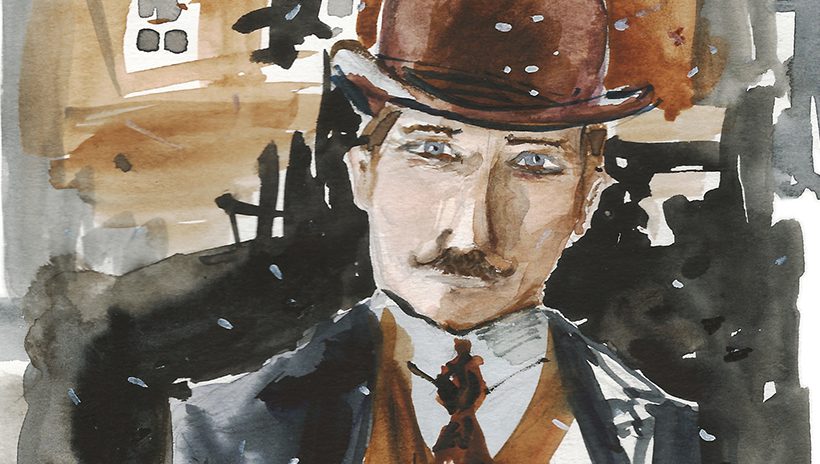No need to mention why since we’re all weary of hearing about it, but we all need a pick-me-up, something to get the creative juices and productivity flowing again. I’ve found that the books and article listed below on productivity, creativity, and success are just the ticket. While they don’t cover librarianship or information literacy work per se, these items offer advice that can be used in any field as well as in one’s personal life.
The Success Mindset of Hercule Poirot
First, a little from a novel I reviewed recently, The Killings at Kingfisher Hill, by Sophie Hannah (Morrow, 2020). Hannah is the Agatha Christie estate’s anointed successor to the famous mystery author, and this book is part of a series that revives Christie’s most famous (and most exasperating) character, Hercule Poirot. What is he doing here in a blog post about productivity? It might seem odd, but he embodies the success mindset that the resources below recommend.

In the novel, Poirot describes his working method, the reason he always succeeds in figuring out “whodunit”: at a certain point in a case, he becomes aware that he can and will solve it. He doesn’t know how yet; he just knows that he will succeed. In Poirot’s own words, “There is a moment in each case […] when suddenly, before the mystery is solved, I see enough of the picture to know for sure that it will be solved. In that instant […] I feel the very same emotions that I would feel if I already knew the answer.”
Wake Up and Live and The Strangest Secret
Poirot’s habit of mind is more practically set out in Dorothea Brande’s 1936 Wake Up and Live (Penguin, 2013), which maintains that acting as though it were impossible to fail is the key to success. (It is available from CreateSpace or as a free PDF.) Believe you will succeed and that’s what will happen, says the forthright Brande. She has no time for niceties and is tough on those who don’t work toward their goals with enough zeal, but the central message of the book is one worth trying. We’ve all seen what a more positive and confident outlook can do, and in Brande’s short book (it can be read in an evening), she offers ways to achieve a success mindset and keep it.
(It is available from CreateSpace or as a free PDF.) Believe you will succeed and that’s what will happen, says the forthright Brande. She has no time for niceties and is tough on those who don’t work toward their goals with enough zeal, but the central message of the book is one worth trying. We’ve all seen what a more positive and confident outlook can do, and in Brande’s short book (it can be read in an evening), she offers ways to achieve a success mindset and keep it.
A similar title to Brande’s, and also an oldie, is Earl Nightingale’s The Strangest Secret, which was originally a 1957 speech that is available on YouTube. The book version, however, uses “people” instead of “men” when discussing how to succeed, so it’s less jarring to today’s readers.
The Checklist Manifesto
 Keeping track of it all is hard, especially when you’re trying to ramp up your work. During quarantine I’ve gotten a checklist habit to stick, a routine I tried to cultivate multiple times without success until trying Gmail’s task list. There are many apps to try, as well as just pen and paper (the feeling of crossing something off is so satisfying!), but I find the Gmail tool simplest, and it’s free. Using checklists to better your productivity is highly recommended by Dr. Atul Gawande in his aptly named The Checklist Manifesto (Picador, 2009).
Keeping track of it all is hard, especially when you’re trying to ramp up your work. During quarantine I’ve gotten a checklist habit to stick, a routine I tried to cultivate multiple times without success until trying Gmail’s task list. There are many apps to try, as well as just pen and paper (the feeling of crossing something off is so satisfying!), but I find the Gmail tool simplest, and it’s free. Using checklists to better your productivity is highly recommended by Dr. Atul Gawande in his aptly named The Checklist Manifesto (Picador, 2009).
Writing about medicine, Gawande says that, unlike in the past, mistakes are usually not due to ignorance. Medical difficulties these days, he says, are due to “the complexity that science has dropped upon us and the enormous strains we are encountering in making good on its promise.” His answer is to use checklists, a strategy that he notes “builds on experience and takes advantage of the knowledge people have but somehow also makes up for our inevitable human inadequacies.” One kind of checklist he recommends is in use when he examines work on a construction project: it’s called a “submittal schedule.” The name sounds rather construction-specific, but is simply a list of who’s going to talk to whom, and when—a concept that can of course be of great value to libraries and other projects and plans.
“Flow” and Attention Management
 Often mentioned when discussing productivity and creativity is the idea of being “in the zone,” when you are able to tune out distractions, have ideas flowing, and are maximally involved in your craft. This state is described by psychologist Mihaly Csikszentmihalyi as “flow.” His 1990 Flow: The Psychology of Optimal Experience (Harper), as well as earlier books by the author and his TED Talk, describe how to enter and maintain this state at work and play.
Often mentioned when discussing productivity and creativity is the idea of being “in the zone,” when you are able to tune out distractions, have ideas flowing, and are maximally involved in your craft. This state is described by psychologist Mihaly Csikszentmihalyi as “flow.” His 1990 Flow: The Psychology of Optimal Experience (Harper), as well as earlier books by the author and his TED Talk, describe how to enter and maintain this state at work and play.
Finally, and much more recent, is an article from Real Simple magazine that encourages a new way of looking at productivity. Time management is impossible, says author Maggie Seaver, because time continues no matter what and because it’s too easy to break an appointment you’ve made with yourself to do a certain task. Instead, try attention management.
Good luck with your new habits, and remember that any gain is an achievement in these stressful times.
See also:


